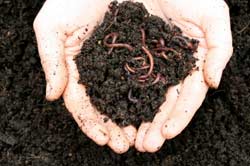 | asheville business & community directory |
|
This is an archived page that may contain outdated or incorrect information. Please visit www.Asheville.com for the latest news, events, and more.
 In the winter it is not always convenient to carry the kitchen scraps out to the compost pile. Some people solve that problem by composting indoors with earthworms.
In the winter it is not always convenient to carry the kitchen scraps out to the compost pile. Some people solve that problem by composting indoors with earthworms.If you do it right, �vermicomposting� does not produce a mess or unpleasant odors, while the worms turn your food scraps into rich compost. A suitable worm bin can be constructed inexpensively. All you need is a plastic box with a lid, and a tray to put under it. A good starter size would be about 2 feet by 2 or 3 feet. Wash and rinse it well. Use a � inch drill bit to drill 9 or more holes in the bottom and a few holes near the top for aeration. The bin will be most effective if located where temperatures stay between 55 and 75 degrees, as the worms are most active in this temperature range. Put the tray under the box in case some liquid leaks out. Next you need to fill the bin with a moist fluffy bedding material for the worms to live in. The most readily available material for most of us is shredded paper. Shredded office paper works, as does ripped up newsprint (black and white sections). Dip the paper in a bucket of water and squeeze out the water so it is just moist. Fluff it into the bin until the bin is nearly full. One more thing you need before adding your worms is a couple handfuls of good garden soil. Earthworms have gizzards and need a little roughage. Perhaps the most important part is getting the right worms. Only redworms (red wigglers), Eisenia foetida, should be used. If you don�t have a friend with a worm bin ready to �harvest,� try a bait shop. There are mail order sources as well. Your worms will eat most types of non-meat kitchen scraps - the same scraps that you would add to a compost pile. When feeding your worms, it is best to bury food scraps under the bedding, choosing a different location each time. I keep a little garden hand cultivator (hand rake) on top of my bin for this purpose. You will soon learn to manage the worm bin. Don�t over-feed them, and keep the right amount of moisture in the bedding. The worms will multiply, so eventually you will be ready to harvest both compost and worms. (Image provided by Buncombe County.)
|
